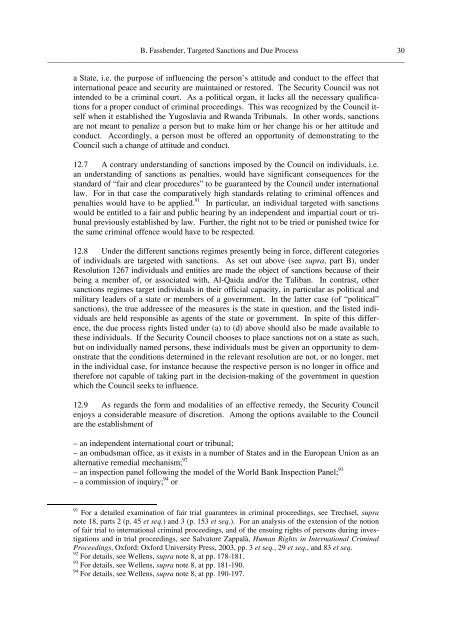Targeted Sanctions and Due Process - United Nations Treaty ...
Targeted Sanctions and Due Process - United Nations Treaty ...
Targeted Sanctions and Due Process - United Nations Treaty ...
You also want an ePaper? Increase the reach of your titles
YUMPU automatically turns print PDFs into web optimized ePapers that Google loves.
B. Fassbender, <strong>Targeted</strong> <strong>Sanctions</strong> <strong>and</strong> <strong>Due</strong> <strong>Process</strong><br />
30<br />
______________________________________________________________________________________________<br />
a State, i.e. the purpose of influencing the person’s attitude <strong>and</strong> conduct to the effect that<br />
international peace <strong>and</strong> security are maintained or restored. The Security Council was not<br />
intended to be a criminal court. As a political organ, it lacks all the necessary qualifications<br />
for a proper conduct of criminal proceedings. This was recognized by the Council itself<br />
when it established the Yugoslavia <strong>and</strong> Rw<strong>and</strong>a Tribunals. In other words, sanctions<br />
are not meant to penalize a person but to make him or her change his or her attitude <strong>and</strong><br />
conduct. Accordingly, a person must be offered an opportunity of demonstrating to the<br />
Council such a change of attitude <strong>and</strong> conduct.<br />
12.7 A contrary underst<strong>and</strong>ing of sanctions imposed by the Council on individuals, i.e.<br />
an underst<strong>and</strong>ing of sanctions as penalties, would have significant consequences for the<br />
st<strong>and</strong>ard of “fair <strong>and</strong> clear procedures” to be guaranteed by the Council under international<br />
law. For in that case the comparatively high st<strong>and</strong>ards relating to criminal offences <strong>and</strong><br />
penalties would have to be applied. 91 In particular, an individual targeted with sanctions<br />
would be entitled to a fair <strong>and</strong> public hearing by an independent <strong>and</strong> impartial court or tribunal<br />
previously established by law. Further, the right not to be tried or punished twice for<br />
the same criminal offence would have to be respected.<br />
12.8 Under the different sanctions regimes presently being in force, different categories<br />
of individuals are targeted with sanctions. As set out above (see supra, part B), under<br />
Resolution 1267 individuals <strong>and</strong> entities are made the object of sanctions because of their<br />
being a member of, or associated with, Al-Qaida <strong>and</strong>/or the Taliban. In contrast, other<br />
sanctions regimes target individuals in their official capacity, in particular as political <strong>and</strong><br />
military leaders of a state or members of a government. In the latter case (of “political”<br />
sanctions), the true addressee of the measures is the state in question, <strong>and</strong> the listed individuals<br />
are held responsible as agents of the state or government. In spite of this difference,<br />
the due process rights listed under (a) to (d) above should also be made available to<br />
these individuals. If the Security Council chooses to place sanctions not on a state as such,<br />
but on individually named persons, these individuals must be given an opportunity to demonstrate<br />
that the conditions determined in the relevant resolution are not, or no longer, met<br />
in the individual case, for instance because the respective person is no longer in office <strong>and</strong><br />
therefore not capable of taking part in the decision-making of the government in question<br />
which the Council seeks to influence.<br />
12.9 As regards the form <strong>and</strong> modalities of an effective remedy, the Security Council<br />
enjoys a considerable measure of discretion. Among the options available to the Council<br />
are the establishment of<br />
– an independent international court or tribunal;<br />
– an ombudsman office, as it exists in a number of States <strong>and</strong> in the European Union as an<br />
alternative remedial mechanism; 92<br />
– an inspection panel following the model of the World Bank Inspection Panel; 93<br />
– a commission of inquiry; 94 or<br />
91 For a detailed examination of fair trial guarantees in criminal proceedings, see Trechsel, supra<br />
note 18, parts 2 (p. 45 et seq.) <strong>and</strong> 3 (p. 153 et seq.). For an analysis of the extension of the notion<br />
of fair trial to international criminal proceedings, <strong>and</strong> of the ensuing rights of persons during investigations<br />
<strong>and</strong> in trial proceedings, see Salvatore Zappalà, Human Rights in International Criminal<br />
Proceedings, Oxford: Oxford University Press, 2003, pp. 3 et seq., 29 et seq., <strong>and</strong> 83 et seq.<br />
92 For details, see Wellens, supra note 8, at pp. 178-181.<br />
93 For details, see Wellens, supra note 8, at pp. 181-190.<br />
94 For details, see Wellens, supra note 8, at pp. 190-197.
















